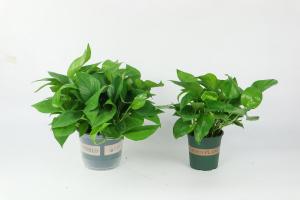Introduction
Peace plants, also known as Spathiphyllum, are popular houseplants that require care and attention to thrive. One of the most essential aspects of caring for a peace plant is watering. However, many people struggle with knowing how often to water these plants. In this article, we will discuss how often peace plants should be watered for optimal growth and health.
Understanding Peace Plant Watering Needs
Peace plants thrive in environments with consistently moist soil. While they do not like to be overly saturated, they also do not do well in dry soil. The key to successfully watering a peace plant is to find the balance between consistent moisture and appropriate drainage. This balance will vary based on a variety of factors, including pot size, soil quality, and surrounding climate.
Determining Frequency of Watering
The frequency at which you should water your peace plant depends on several different factors. For example, larger peace plants in larger pots will need to be watered less frequently than smaller plants in smaller pots. Additionally, peace plants in environments with high humidity may require less frequent watering than those in dry air. A general rule of thumb is to water your peace plant once a week, but this can vary based on individual circumstances.
Signs of Overwatering
Overwatering is one of the most common reasons why peace plants fail to thrive. Signs of overwatering include yellowing leaves, root rot, and a generally droopy appearance. If you notice any of these signs, it is important to adjust your watering frequency to prevent further damage to the plant. In some cases, you may need to repot the plant and replace the soil to improve drainage.
Signs of Underwatering
While overwatering is a common issue, underwatering can also cause problems for peace plants. Signs of underwatering include brown, crispy leaves and soil that is completely dry. If you notice these signs, it is important to increase the frequency of watering and to ensure that the plant is adequately hydrated. In some cases, you may need to mist the foliage to increase humidity levels.
Conclusion
Proper watering is essential for the health and vitality of peace plants. While the frequency of watering will depend on a variety of factors, keeping the soil consistently moist without overwatering is key. By paying attention to the signs of both overwatering and underwatering, you can adjust your watering frequency and techniques to ensure that your peace plant thrives.

 how many times do yo...
how many times do yo... how many planted tre...
how many planted tre... how many pine trees ...
how many pine trees ... how many pecan trees...
how many pecan trees... how many plants comp...
how many plants comp... how many plants can ...
how many plants can ... how many plants and ...
how many plants and ... how many pepper plan...
how many pepper plan...






























